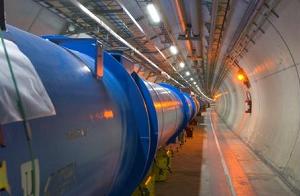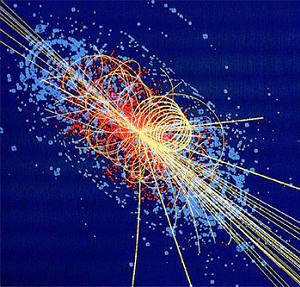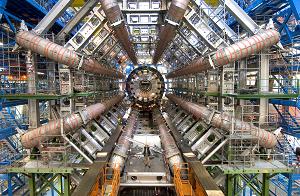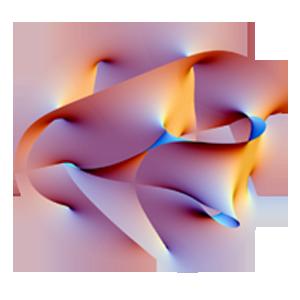The LHC: God is Shrinking
God, as one of the more useful definitions go, is everything mankind does not understand. In ancient times, the sun and many other forces of nature were attributed to—and often named for—different gods, and now, as science expands our understanding of the universe, we no longer find ourselves praying to the sun for a bountiful harvest. Still, no matter how much is illuminated, God is never truly defeated, for there are some questions that science may never be able to answer.
 | | The God donut? |
Today, though, God is about to get a tiny bit smaller thanks to the Large Hadron Collider, an enormous particle accelerator (or atom smasher, if you prefer) that was just fired up for the first time last week. This scientific instrument—the largest ever built—is about to bring about a new golden age of scientific discovery. Many of the big looming questions in theoretical physics could potentially be addressed, from supersymmetry and extra dimensions to dark matter and massive new particles we haven't even thought of yet. We might even get closer to the holy grail of modern theory—the bridge between Einstein's theory of general relativity and the mind-bendingly weird theories of quantum mechanics.
All of these big questions are going to be explored by the most insignificant sounding event, the collision of tiny bits of matter. Hydrogen atoms stripped of their electrons (in other words, bare protons)* will be run through an enormous underground donut of superconducting magnets at speeds insanely close to the speed of light, traversing the entire 27 kilometers of the machine about 11,000 times a second. Then the protons will collide with anti-protons (negatively charged bits of anti-matter), resulting in a nearly instantaneous and infinitesimal explosion of high energy that will, essentially, be caught on camera (it's not really a camera, but that's a safe analogy).
*Actually, protons are only one type of "hadron" that will be accelerated in the LHC. However, since most of the experiments—especially in the beginning—will involve protons rather than the nuclei of metallic elements or other hadrons, it's easiest to stick with this in explanations.
 | | The projected image of what a Higgs Boson would create during a high energy particle collision |
Thanks to Einstein's famous E=mc2, this collision of highly energized particles will not only result in an orgasmic release of energy, but it will also create mass at its most fundamental—and infuriatingly unstable—levels. Using smaller particle acceleraters like the one at Fermilab, this method has been used to identify several subatomic particles, including quarks, bosons, and other strange things. However, the LHC is stronger than even the best particle accelerator in the world, by a factor of about ten.
One bizarre particle that has existed in theory and has not yet been seen in a particle accelerator is something called the Higgs Boson, which is the first thing people usually talk about when they start talking about the LHC. This particle, if discovered, would provide very strong evidence for the existence of the Higgs Field, a concept describing how subatomic particles gain mass (among other things). This concept is so monumental that some have called the Higgs Boson the "God Particle." It's discovery would be nothing short of incredible, but even more exciting would be its absence.
One of the biggest misconceptions about scientists is that they prefer to see their theories and expectations proven. In actuality, scientists tend to get giddy when the evidence flies in the face of their expectations, because it opens up a whole new puzzle for them to solve. Even if the LHC proves the existence of the Higgs Boson, it will surely disprove many other predictions and show things that are strange and unexpected. This is how science progresses, not with dry confirmations, but with wild paradigm shifts.
 | | The LHC under construction or How astronauts really go potty (click to see a much larger picture) |
Quantum mechanics was one such paradigm shift, one so enormous even Einstein had a hard time believing it. Without getting into detail, quantum mechanics describes the nature of the universe at the smallest level, a level so tiny that the rules of conventional physics and logic no longer apply. Quantum mechanics has been immensely successful at describing the world of the small (without quantum mechanics, for example, we wouldn't have computers) and has lead to what is called the standard model of particle physics, a model that unifies three of the four universal forces (electromagnetism, the weak nuclear force, and the strong nuclear force). However, whenever you try to integrate the forth force, gravity, the equations tear themselves apart with infinite variables, meaning the theories no longer make sense.
This is why scientists study black holes and the big bang, because they are the only instances of the very large coming together with the very small. Here, the disparity between general relativity and quantum physics becomes so large we cannot understand how the universe copes. The very fact that we (and black holes) exist, though, indicates that, somehow, the universe copes just fine.
 | | What a tiny new dimension would probably look like |
When journalists and scientists talk about the LHC recreating the conditions immediately after the big bang, they're being misleading, because the LHC isn't actually going to cause "little big bangs." The immense energy and mass potential of the particle collisions that will be done at the LHC is incredibly similar to what happened when the universe went through the massive cooling of those first few nanoseconds of existence, but they are not indicative of a new creation. Still, according to theory, things like the Higgs Boson were running rampant in the baby universe, and if we find the earmarks of such things, we get closer to understanding how the universe deals with relativity and quantum mechanics coming to a head.
More than that, though, (and less likely) the LHC could potentially give evidence of supersymmetry and the Kalusa-Klein theory, which confirms (though fails to prove) the unsteady predictions of extradimensional space and string theory. If that's over your head, just know that I'm talking about new dimensions and crazy-cool theories on the fringes of modern scientific thought.
Put simply, the LHC marks the biggest scientific advance in nearly a hundred years. Our dusty theories about how it all works will now be revisited and revised, and whole new theories will be born. This will bring about new technologies, new frontiers, and a much deeper understanding of reality. You could definitely say humanity is making God smaller, but I like to think that we're just getting closer to him.
-e. magill, 09/15/2008
|
|